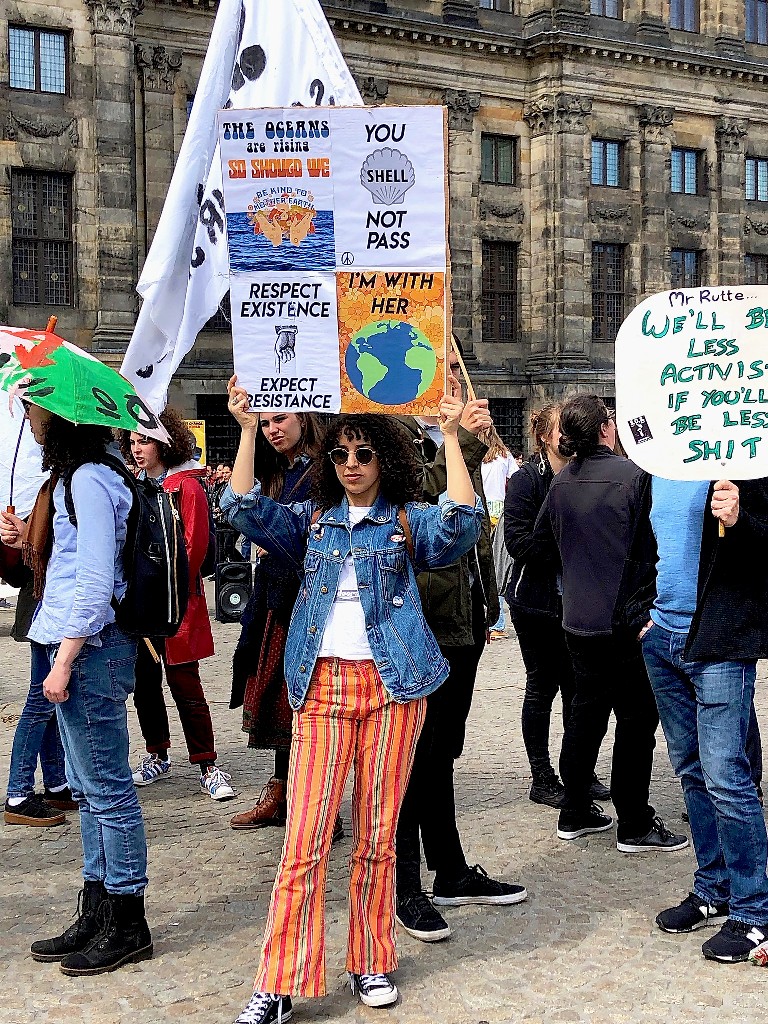Woord van het Jaar 2019! Posted by Sten on Jan 14, 2020 in Culture, Dutch Language, Dutch Vocabulary, News
The last year of the previous decade has just elapsed two weeks ago, and that means that we have new woorden van het jaar (words of the year). Let’s see what words 2019 brought!
Het klimaat
Nothing gained as much traction in 2019 as het klimaat (the climate). From the Fridays for Future demonstrations all around the world to major climate conferences, 2019 was a big year for klimaatverandering (climate change). So unsurprisingly, the woord van het jaar relates to it.
OnzeTaal members elected the word -schaamte (shame) as their term of 2019 with 20% of the vote. Directeur (director) of OnzeTaal, Vibeke Roeper, said the following about the word:
“Het zegt in kort bestek veel over het groeiende ongemak dat we voelen bij milieubelastende keuzes. Daardoor karakteriseert -schaamte heel goed het jaar, dat voor een groot deel in het teken stond van klimaatdiscussies. Maar ook in talig opzicht heeft -schaamte een aardige kant: het kan overal achter geplakt worden.”
(“It briefly says a lot about the growing discomfort we feel when making choices that impact the environment. That’s why “shame” characterizes the year very well, which revolved largely around climate discussions. But also from a linguistic perspective, “shame” has its merits: It can be added behind every word.”)
With “shame”, you might think of the Swedish flygskam, which actually saw a reduction in flights in the Nordic country, and its Dutch tegenhanger (equivalent) vliegschaamte (flight shame)1Vliegschaamte was also nominated for Woord van het Jaar 2018. But there are more such words in Dutch, such as sproeischaamte (spraying shame), our Word of the Month July 2019, actually. This was a real thing, too, where people felt bad for “wasting” water spraying their plants in the hot summer.
Brexitmoe (Brexit-tired) was a close second with 17%. Brexit is something we Europeans have perhaps heard too much about in 2019. What it would mean for the Netherlands we covered here on the blog. An even closer third, with only 2 stemmen (votes) behind number 2, came stikstofcrisis (nitrogen crisis), a legal crisis with some real consequences earlier this year in the Netherlands, which we also covered here on the Transparent Language blog.
In the bigger Van Dale election for the Woord van het Jaar, klimaatspijbelaar (climate truant) and klimaatdrammer (climate whiner) came in second and third, with 14.2% and 9.6%, respectively. So also related to the Fridays for Future protests and how certain people felt about them. But what is the Van Dale Woord van het Jaar?
A Meme Won!
You have probably heard the words “OK, boomer” at some point in the past months. The term went all over the world, and was even used in the New Zealand parliament by a 25 year-old to shut down a heckler. It is used as a one-stop answer to anybody with conservative ideas. And now the word boomer wins the Woord van het Jaar with a fat 41.8% of the stemmen! The Van Dale defines the word boomer as follows:
(jongerentaal) persoon, m.n. van gevorderde leeftijd, met ouderwetse denkbeelden of conservatieve opvattingen, synoniem fossiel ◦ verkorting van Engels baby boomer [geboortegolver]
((youth language) person, especially of advanced age, with old-fashioned ideas or conservative views, synonym fossil ◦ shortening of English baby boomer [“birth waver”])
A reader’s column at Metro Nieuws by Annemoon van Maastricht had the following to say about it:
“Iemand die niet in klimaatverandering gelooft? Ok, Boomer. Iemand die denkt dat homoseksualiteit iets onnatuurlijks is? Ok, Boomer. De zin is het ultieme antwoord van een generatie die zich niet serieus genomen voelt.”
(“Somebody that does not believe in climate change? Ok, boomer. Somebody that thinks homosexuality is something unnatural? Ok, boomer. The sentence is the ultimate answer of a generation that does not feel taken seriously.”)
And with the kind of votes this term got for Woord van het Jaar, you can really see that it resonated. Together with how the climate issue was pushed into the public sphere by the youth like never before, “OK, boomer” encapsulates a wider dissatisfaction among younger people to get a say. Of course, “OK, boomer” is first and foremost a joke, a meme.
But it seems to have some real power behind it.
What do you think about these words of the year? What were your words of the year? Let me know in the comments below!
- 1

Build vocabulary, practice pronunciation, and more with Transparent Language Online. Available anytime, anywhere, on any device.




